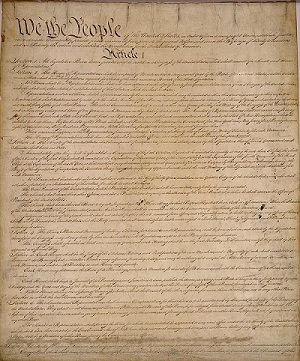“You say you’ll change the constitution, well you know, we all want to change your head.”
—The Beatles, “Revolution 1” (Lennon/McCartney)
 Constitutional amendments don’t come easy, and that is the way it was intended. The first ten amendments, or the Bill of Rights, were enacted in December 1791, less than 3 years after the Constitution which went into effect in March 1789. Since then, there have been only 17 amendments approved and ratified, and of those, the 18th Amendment (which prohibited alcohol) was repealed by another (the 21st).
Constitutional amendments don’t come easy, and that is the way it was intended. The first ten amendments, or the Bill of Rights, were enacted in December 1791, less than 3 years after the Constitution which went into effect in March 1789. Since then, there have been only 17 amendments approved and ratified, and of those, the 18th Amendment (which prohibited alcohol) was repealed by another (the 21st).
Article V of the United States Constitution provides that it may be amended in one of two ways:
1. Congress may propose amendments to the states with the approval of the House of Representatives and Senate by a two-thirds (2/3) vote. To become effective, the amendment must be ratified by the legislatures of three-fourths (3/4) of the states or state ratifying conventions.
2. A national constitutional convention may be called at the request of 2/3 of the legislatures of the states. Again, any proposed amendments must be approved or ratified by 3/4 of the states.
To date, all of the amendments to the Constitution have been proposed by Congress (i.e., way 1); a national constitutional convention has never been called since the adoption of the “original” Constitution, though there have been attempts; the most recent have centered on calls for a balanced budget amendment, with as many as 32 states having petitions pending with Congress at one time.
Although amending the Constitution through Congress seems like an almost insurmountable obstacle in the current political climate, social movements, Supreme Court rulings and other historical events appear to lead to proposed amendments on an almost cyclical basis. The ongoing military conflict, fiscal cliff and a deep political divide may produce the type of environment that leads to government structural change. A constitutional convention could be thought of as a peaceful revolution—and would be excellent education on civics. To paraphrase Thomas Jefferson, a little ‘revolution’ now and then is a good thing . . .






